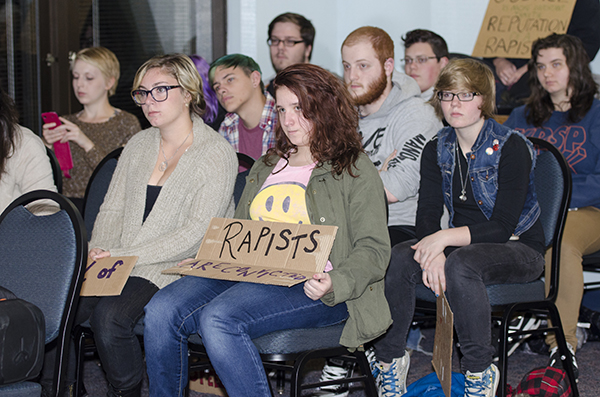

More than 20 students crowded the fourth floor of the Student Union Wednesday night as part of a sit-in to protest comments made by student senators that protestors felt perpetuated rape culture at the Oct. 16 senate meeting.
At the 56th Student Senate meeting on Oct. 16, Executive Vice President of Academic Affairs Jordan Taylor led a discussion about the Oct. 5 assault of a woman on Plattekill Avenue.
Some senators took issue with the email sent to students from The University Police Department (UPD), with an attached press release from the Town of New Paltz police department that included the name, age, ethnicity and hometown of the alleged attacker in the assault.
Senator Nadia Alirahi said she felt it was unnecessary to reveal the alleged attacker’s ethnicity, hometown and additional personal information aside from the name.
“I don’t agree with all his information being released to the public because although he is handcuffed, under New York State law, he is still presumed innocent until proven guilty,” Alirahi said. “Unless policy has specifically changed, you shouldn’t be tainting someone else’s character.”
Emily Kennedy, a third-year student who is a member of Feminist Collective, Queer Student Union and New Paltz Survivors Support Group, helped to organize the sit-in at the meeting.
“This is a matter of public safety and should be public knowledge for just that reason [releasing the alleged attacker’s name],” Kennedy said.
A sit-in was decided the most effective way to protest because it sends an obvious message to SA, Kennedy said.
“I hope that SA realizes that they aren’t supporting or representing our student body with good intentions at all by supporting a rapist over a survivor,” Kennedy said. “They need to realize why their statements are making this school an even more dangerous place for survivors and anyone who could be attacked.”
Rachel Dornheim, a founder and facilitator of the New Paltz Survivors Group, spoke to the Senate on behalf of everyone protesting.
She spoke out against rape culture and addressed that it was a “big issue when people are talking about how much the assailant’s life will be stigmatized because he committed a crime, when the survivor is most likely going to develop PTSD (post traumatic stress disorder).”
Dornheim also said she is looking to create a more open discussion about rape culture, as well as racism — not wanting to belittle the issue of race, because “men of color and Latino men are wrongly stereotyped as the majority of rapists.
She questioned why UPD and New Paltz Town police are “making this just about black males.”
“We’re mad that when there are white rapists on this campus, we don’t get emails sent out about them,” Dornheim said. “The past three emails I can think of [from police regarding sexual assaults], the emails all said it was a black male, when there are serial rapists on this campus that are white, and no one’s sending emails about that.”
Of the Oct. 16 Student Senate, Executive Vice President Zachary Rousseas said that he felt uncomfortable through the discussion of releasing the name of the alleged attacker because it was a “triggering conversation” where rape culture was indirectly being perpetuated.
Rousseas said he believed that the majority of senators came to a consensus that there should be a formal rubric and a policy Town Police should abide by when dealing with these situations — a standard for the extent of the characteristics and personal information of the alleged attacker that should be released. However, he said it was not discussed any further and no legislation has been written.
